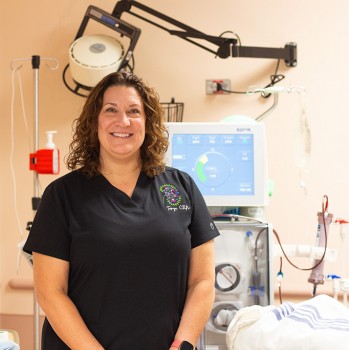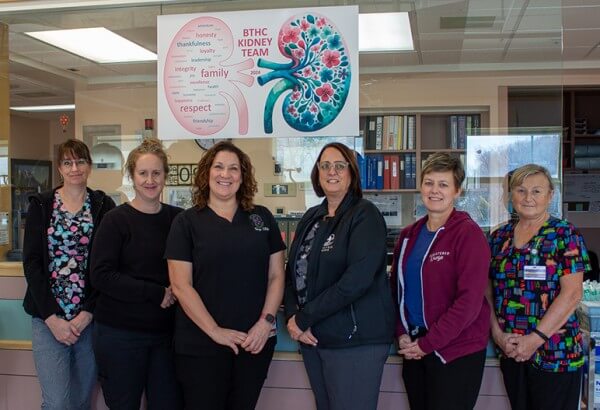Building Trust at Boundary Trails Health Centre – Dialysis nursing offers continuity of care
One of the beautiful things about dialysis nursing is that we have the privilege of connecting with our patients and their families on a deeper level. Seeing them three times a week allows us to form relationships, build trust and care for them more holistically, often discovering issues sooner and finding solutions to their medical problems faster. – Tanya Blatz, Clinical Resource Nurse, Dialysis Unit, BTHC

As a young woman Tanya Blatz considered many careers, and among her top choices were dietitian, teacher, or nurse – like her mom. She didn’t know it then, but years later Blatz would discover a job that encompassed all of those roles.
The role of a dialysis nurse includes nursing, educating patients on their kidney conditions and treatments, and extensive instruction on the strict and complex dietary requirements of dialysis patients, commonly known as the “dialysis diet.”
Dialysis nursing was a perfect fit for Blatz, and for the last seven years she has worked as the Clinical Resource Nurse for the dialysis unit at Boundary Trails Health Centre (BTHC), overseeing the unit’s staff and acting as a medical hub for the health centre’s dialysis patients.
“I do anything and everything on the unit including organizing specialty appointments for our patients, attending the weekly nephrology rounds, collaborating with other members of the medical team like social workers, pharmacists, and dietitians, and even troubleshooting the dialysis machines when they break down,” said Blatz. “I have a wide spectrum of work in this role and I absolutely love it.”
Along with the variety of work, the ability to care for the same patients every week over many years is very rewarding for Blatz and her colleagues. Having that continuity of care can also result in better health outcomes as staff can monitor their patients regularly and notice changes in their health sooner.
“One of the beautiful things about dialysis nursing is that we have the privilege of connecting with our patients and their families on a deeper level,” said Blatz. “Seeing them three times a week allows us to form relationships, build trust, and care for them more holistically, often discovering issues sooner and finding solutions to their medical problems faster.”
BTHC has the capacity to serve up to 34 dialysis patients each week, with patients coming to the health centre from areas across the Southern Health-Santé Sud region including nearby towns like Morden and Winkler, to further towns like the Roseau River Reserve and Saint Jean Baptiste.
Historically, nurses who were interested in applying for the dialysis course to become a dialysis nurse needed a minimum of five years of nursing experience in other areas, such as long-term care or acute care. This requirement was due to the complex nature of providing care to dialysis patients.
“The patient’s heart affects their dialysis treatment, any acute problems, infections, or chronic conditions affect their dialysis treatment, and their diet and levels of various minerals all affect their dialysis treatment,” said Blatz. “This work requires you to troubleshoot, problem solve, and think critically, and those skills are strengthened with experience.”
Today that five-year minimum requirement no longer exists and newer nurses are eligible to apply for the dialysis course. Blatz recommends dialysis nursing to any student or existing nurse who is exploring the wide range of nursing professions.
“I didn’t know about this role until many years after I entered the workforce and wish I had learned about it sooner,” said Blatz. “Whenever an educator asks to bring students in I never say no because there might be one in the crowd that goes, ‘hey, this looks really interesting’ and decides they want a career in dialysis nursing.”

Nursing Week runs May 6-12 this year and is a time to recognize the incredible accomplishments and contributions that nurses bring to health-care teams and the delivery of services across the province.
